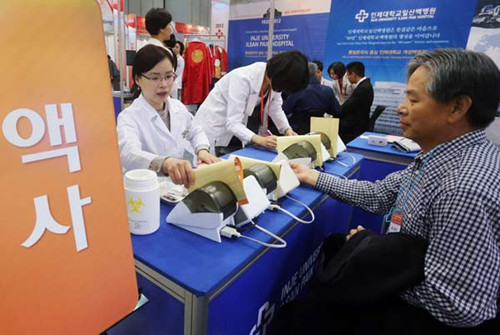
A man asking about medical information at a recent medical tourism fair in Seoul. It has become a trend in China for middle-income and affluent people to travel abroad for medical care services. South Korea is one of the most popular destinations for Chinese wanting treatment. Provided to China Daily
Number of medical tourists rises because of cheaper costs, services
Talking about her recent trip to Thailand, Wang Jingxian said it was "really worthy as well as comfortable and happy".
The 35-year-old Beijing white-collar worker traveled to Bangkok in October for skin laser surgery to rejuvenate her appearance at Bumrungrad International Hospital, one of the world's top 10 multiple-specialty medical centers targeting patients globally.
"I appreciated the environment and services of the hospital. And it's affordable, even cheaper than the private medical institutes in Beijing," Wang said.
It has become a trend in China for middle-income and affluent people to travel abroad for medical care services.
An online survey conducted by Ipsos, a France-based market research company, shows 74 percent of Chinese respondents said they would look outside the country for cheaper healthcare services.
According to the poll covering 24 nations, 59 percent of respondents in the Asia-Pacific region would consider traveling to another country to receive medical or dental care if the costs were significantly lower than in his or her country. In Latin America the figure was 64 percent. In the Middle East and Africa it was 63 percent.
The findings shed light on medical tourism, an increasingly popular worldwide phenomenon that is becoming a formalized industry in many countries.
Chinese tourists
Chinese people's interests in overseas medical tourism might be attributed to limited and competitive medical resources in the domestic market, the high-quality and considerable number of services in well-known foreign private hospitals, relatively low costs overseas and the added value of travel, according to Hu Bo, chairman of Ciming Health Checkup Management Group Co Ltd.
Wang said she spent around $1,000 for surgery and hospitalization in Bangkok. With flight tickets and some incidental fees, the 10-day trip cost her $2,000.
"The hospital's lobby was like a five-star hotel offering concierge-style services. The medical practitioners were patient and nice. The food was really fantastic. All of these things were impressive," she said.
Hu said that most Chinese middle-class health travelers are eyeing Southeast Asian nations, such as Thailand and Malaysia, while some of the richer ones are going to developed markets such as Switzerland for anti-aging therapy using sheep placentas and Germany for general health checkups and health improvement.
Malaysia is attracting Chinese people with a six-month visa brought into play last year. Chinese medical tourists to the nation rose 48 percent year-on-year in 2011.
South Korea is well known for its plastic surgery services. A source in the South Korean embassy in China said it issued 1.07 million visas to Chinese medical travelers last year, up 386 percent year-on-year. At the same time, there were 2.05 million visits by Chinese people to the East Asian country, an annual increase of 23.6 percent.
Demographically, younger adults appear more open to going abroad to seek cheaper medical or dental work, the Ipsos report said.
On the global aggregate level, 19 percent of those under the age of 49 said they "definitely would" go, compared with 15 percent of those aged between 50 and 64. Employed individuals are more likely than unemployed to do so, as are men - 19 percent - rather than women - 17 percent. This is very typical of Indian and Chinese responses, with nearly eight in 10 of the younger generations claiming to go for medical tourism.
Industry development
Many nations are now devoted to making tourism a new industry to earn money. Statistics from Thailand's health ministry show that foreign travelers to the nation for medical services amounted to 2.24 million, bringing millions of US dollars in revenue to the Southeast Asian country.
Thailand forecast that there will be 2.53 million medical service travelers to the nation in 2012. The medical tourism industry there is expected to contribute $24.4 billion in revenue to the country over the next five years.
According to the Medical Tourism Association, about 6 million people, mainly from the United States, Japan, Europe and the Middle East, went abroad seeking medical services in 2011. About 1.2 of them chose Thailand and 450,000 selected India. Their decisions were mostly based on lower prices or shorter waiting periods.
However, risks still exist, given the different legal requirements in different nations, inadequate medical insurance systems offered by related hospitals as well as unexpected medical disputes caused by language barriers and cultural differences, say observers.

Copyright ©1999-2011 Chinanews.com. All rights reserved.
Reproduction in whole or in part without permission is prohibited.